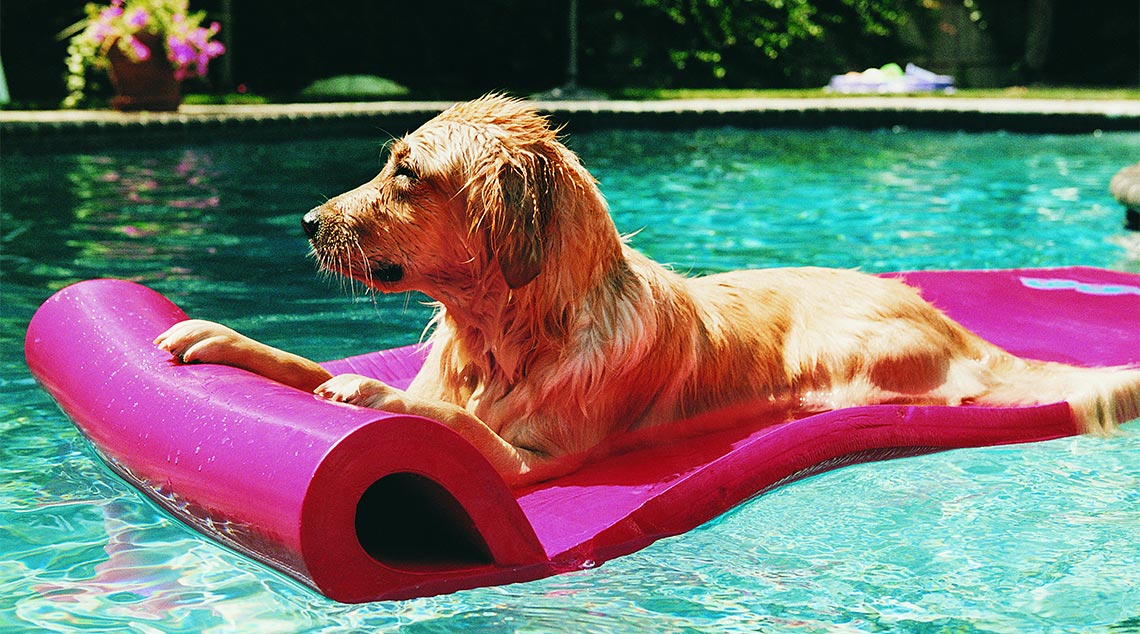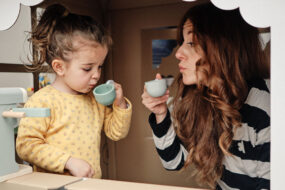Chill paws and wagging tails: Hot tips for keeping pets cool
The only hot dogs you see this summer should be on the barbecue, so help your furry friends keep cool with these handy tips.
Helping cats and dogs beat the heat should start with paying attention to their diet and ensuring they are groomed, Sydney vet Dr Kate Adams says.
The star of Bondi Vet and The Real Housewives of Sydney says keeping pets within a healthy weight range will make hotter months easier for our four-legged pals to stomach.
“If your pet is overweight, start looking at the portion sizes of their meals and cutting them back a little rather than just trying to increase their activity,” Dr Adams says.
“While they may not be happy about their smaller meals, they will be happier pets in the longer term.”
Likewise, grooming is a good way to stay cool.
“Again, it seems obvious, but you’d be surprised at how many people bring their dogs in for being lethargic in the summer months with the presumption there is something wrong with them – when really it could be fixed with a good groom,” Dr Adams says.
All creatures great and small
The age and size of a pet can also be a risk factor.
Dr Adams says keeping older animals indoors near a fan or air conditioner will help stave off problems.
“Older pets take special care – just like older people,” Dr Adams says.
“No matter how healthy they are, they are still elderly and find it more difficult to tolerate the heat than younger dogs. At Bondi Vet Hospital, I have more heart failure deaths in older pets on the hot days.”
RSPCA Australia senior scientific officer Dr Di Evans says smaller pets such as rabbits, birds, guinea pigs, rats and mice are often kept in cages or hutches, making it “harder for them to seek out cooler places for themselves”.
She suggests they are moved inside to the laundry or bathroom on a hot day because even shaded parts of the garden could prove hazardous.
Be sun smart
Dr Evans also reminds people not to leave a pet unattended in the car because “the temperatures inside the car can climb to double the outside temperature even on a milder day”.
Death and serious brain damage can occur in a matter of minutes.
She urged anyone who spots a distressed pet left unattended inside a car to seek immediate assistance.
Better Homes and Gardens’ resident vet Dr Harry Cooper says it’s important to keep an eye out for signs of heat stress in animals and then act quickly.
“The most obvious sign of heat stress in both dogs and cats is excessive panting. Both cool themselves down by evaporating moisture from their mouth, nose and lungs,” Dr Harry explains.
Birds have no sweat glands so cool themselves by keeping their beaks open and their wings out.
If your pet does experience heat stress, Dr Harry recommends cold water – “and plenty of it” – all over the animal.
“If it’s small enough, support the head and totally immerse your pet in a cold-water bath. Don’t dry it. Leave the patient wet. Then it’s off to the vet.”
Believe it or not, even pets need to slip, slop, slap.
Dr Harry says ginger and white coloured cats, in particular, are really prone to skin cancers and recommends keeping them out of the sun between 11am and 3pm, when UV radiation is at its worst.
He also suggests using sunscreen for noses and ears, which are most vulnerable to the sun.
Strategies for summer pet safety
- Move birdcages and aquariums away from the window.
- Add ice blocks to water bowls.
- Walk dogs early in the morning or well after the sun goes down.
- Make sure you leave out at least two water bowls so there is a back-up if one gets knocked over.
- Freeze wet towels and put them in your pet’s bed.
More pet care advice:
- Don’t eat that! 7 common plants that are toxic to your pet
- Pets can get dementia too – here’s what to know
- Common Christmas foods that are toxic for pets
Written by Siobhan Duck.





